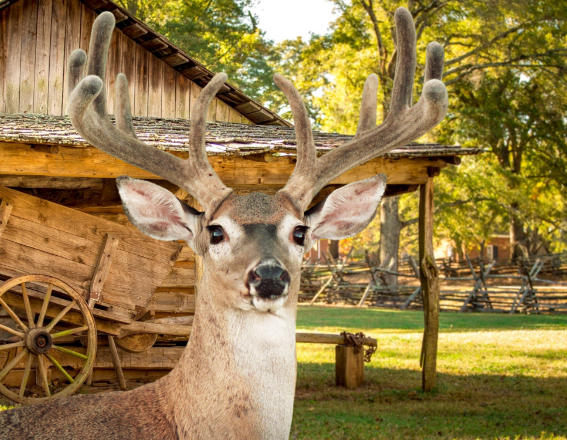What Part of Tennessee Has the Biggest Deer?
If you’re looking to take on a big game hunt, you might be wondering what part of Tennessee has the biggest deer. While there’s no specific area in the state that’s known for its abundance of big deer, there are a number of places in the country that can provide you with a good opportunity to catch the animal of your dreams.
What part of Tennessee has the biggest deer?
Table of Contents
There are many places in Tennessee where you can hunt. You can chase bears, waterfowl, and whitetail deer. If you’re into big bucks, you might want to consider a hunt in Sumner County. The county has the largest population of whitetail deer, as well as some of the state’s biggest bucks.
Deer are found in Tennessee in every region of the state, from sea level to high mountain elevations. They are browsers, consuming young trees and vegetation. Based on seasonal availability, they eat a variety of herbaceous plants, such as grasses, herbs, and shrubs.
Whitetail deer are protected under Tennessee law. However, they are also vulnerable to a disease known as hemorrhagic disease (HD), which can cause the animal to lose appetite. HD is fatal once contracted. It is a neurological disorder that affects animals through animal-to-animal contact.
According to the TWRA, the majority of the deer herd in Tennessee is located in western and middle Tennessee. Eastern and far eastern counties have fewer deer and lower densities.
During the 2015-16-hunting season, the deer bag limit was reduced from three to two. This cut helped increase the trophy buck population in Tennessee.
Does Tennessee has big deer?
Whitetail deer have played a significant role in human lives for generations. Their natural habitat ranges from sea level to high elevations in the mountains. They eat young trees, fruits, and herbaceous plants, depending on the season and availability. In the wild, they rarely live for more than seven years.
The Tennessee deer herd has been increasing since the 1940s. In 2005, the population exceeded 900,000 animals. This represents a 1-2-percent increase per year.
Hunting opportunities have increased with the expansion. Today, there are six different deer hunting units across the state. Most of the best hunting is on managed private land.
Hunting licenses are required. Licenses can be purchased online or through many retailers. Out-of-state hunters must also obtain a TN non-resident hunting license.
During the deer season, hunters can hunt whitetail deer with a muzzleloader or shotgun. There are also black bear and elk hunting seasons.
While the majority of the deer population in the state is located in middle and western Tennessee, eastern counties have been slow to increase in population. Counties such as Mississippi River counties have low densities.
Can you bait deer in Tennessee?
There is a lot of confusion about baiting deer in Tennessee. Some believe it is legal while others claim it is illegal. The answer lies in understanding the laws and regulations surrounding this topic.
In addition to being one of the most populous states in the country, Tennessee also has a wide variety of game animals to hunt. Some of the more popular species include deer, turkey, and squirrel. Other game animals in the state include bear and elk.
It is also important to remember that some public hunting areas may have specific bag limits. Check with your local wildlife officer to learn more about the specifics of the area where you plan to hunt.
Baiting is defined as scattering, depositing, or exposing some form of feed. A sign should be placed over the bait to identify it as a baiting site.
It is also legal to feed deer in some areas. However, the law does not allow you to place corn or wheat around a deer stand.
Some other states allow the use of salt blocks as deer bait. If the blocks contain at least 51% of salt, then they are considered legal.
Is there any elk in Tennessee?
Throughout the early days of American settlement, elk roamed the country in great numbers. They were a valuable resource for explorers, hunters, trappers, and farmers. However, overhunting and habitat destruction caused the elk population to decline.
Luckily, the Tennessee Wildlife Resources Agency (TWRA) has started an effort to bring the elk back to the state. In May 2017, the agency held two public hearings about the proposed elk management plan.
Initially, TWRA plans to release 400 elk into the Elk Restoration Zone, a large tract of land extending across five counties. The elk will be fitted with radio collars. A healthy, viable population should be reached within 16 years.
Elk were once common throughout the Appalachian mountain range. These animals roamed over much of the United States, but their population began to dwindle in the late 1800s. Their numbers were decimated by overhunting, habitat destruction, and unregulated hunting.
The last elk in North Carolina was believed to have been killed in the late 1700s. Fortunately, there are still a number of elk in Tennessee.
Are there moose in Tennessee?
If you’ve been wondering whether or not there are moose in Tennessee, you’re not alone. There are many species of animals in the state, from cougars to black bears. Some think they’ve even seen wild wolves in Tennessee, but that is not true.
Most moose live in Alaska, Russia, and Finland. They’re also found in Scandinavia, Poland, Ukraine, and Belarus. The moose is a herbivore, and it’s a member of the deer family. It can weigh as much as 1,600 pounds, with antlers that may reach 40 pounds.
You’ll find elk and bison in Tennessee. These are the animals you’re most likely to see. However, there are a few other mammals in the state.
Moose are a large herbivore that lives in northern forests and wooded areas. Their diet includes trees, shrubs, and flowers. They are fans of balsam fir, Aspen, and willow trees. In fact, they prefer these trees over other types of vegetation.
Grizzly bears kill adult moose in the spring. However, they don’t usually kill calves. A mature moose can weigh up to two meters in height, and antlers can be as heavy as 40 pounds.
Where are elk in Tennessee?
Elk are native to Tennessee. They were a common sight in the Appalachian Mountains in the 18th and 19th centuries, but their population was reduced by habitat loss and unregulated hunting. Since the mid-1900s, they have not been seen in the state.
Tennessee has been working to bring back elk herds since 2000. In that time, it has received funding from the Rocky Mountain Elk Foundation. The University of Tennessee is a partner in the elk restoration program, along with the U.S.G.S. Biological Resources Division and Friends of Smokies.
There is a herd of over 400 elk in Tennessee. Most of them live in the Cataloochee Valley preserve in the Great Smoky Mountains National Park. However, elk are also found in the Oconaluftee Valley, the Cumberland Plateau, and other parts of the state.
Over the next 16 years, the elk population in Tennessee will increase to at least 1400. In addition, the Agency plans to obtain additional elk. These will be ear tagged and will be released into the Tennessee elk release zone.
Are salt licks legal in Tennessee?
This is a question I receive quite frequently. My answer to this question is that no, salt licks are not legal in the State of Tennessee. However, one may feed a horse in the name of research, provided a certain high-powered scientist is willing to put his or her snooty hat on the line. Also, I would not be surprised if a Director of Wildlife Resources were to award a prize for the best deer frenzies, provided the requisite paperwork is in order. Sadly, this type of reward is not available to all.
There are several reasons for this, but the most important is the fact that salt licks occupy prime hunting real estate. As a matter of fact, most suitable counties in the state have at least a few. A number of these properties are underutilized and have been exploited by predators. The state of Tennessee is not a dumping ground for the likes of Ohio and New York. That said, it does boast a healthy bounty of whitetail deer.
How far from a house can you hunt in Tennessee?
Tennessee is a state that offers a wide variety of game animals, from deer to squirrel to turkey. In fact, you can hunt hundreds of thousands of acres in Tennessee. But, there are some important rules that you should keep in mind. For example, you must respect the rights of the landowner.
When hunting on private land, you may seek permission from the owner. You also need to follow the regulations set by the state. Depending on the game animal you plan to hunt, you may be required to wear a hunter orange.
Hunting licenses are required for anyone who wishes to hunt in Tennessee. There are different types of licenses, depending on your age, residency, and the type of game you want to hunt. Some lands, like state and federal wildlife refuges, have additional rules and regulations.
Residents of Tennessee who are not born after January 1, 1969 must have a Hunter Education Card. This is an in-person classroom course and includes a 100-question final exam. The course can be taken online as well.




